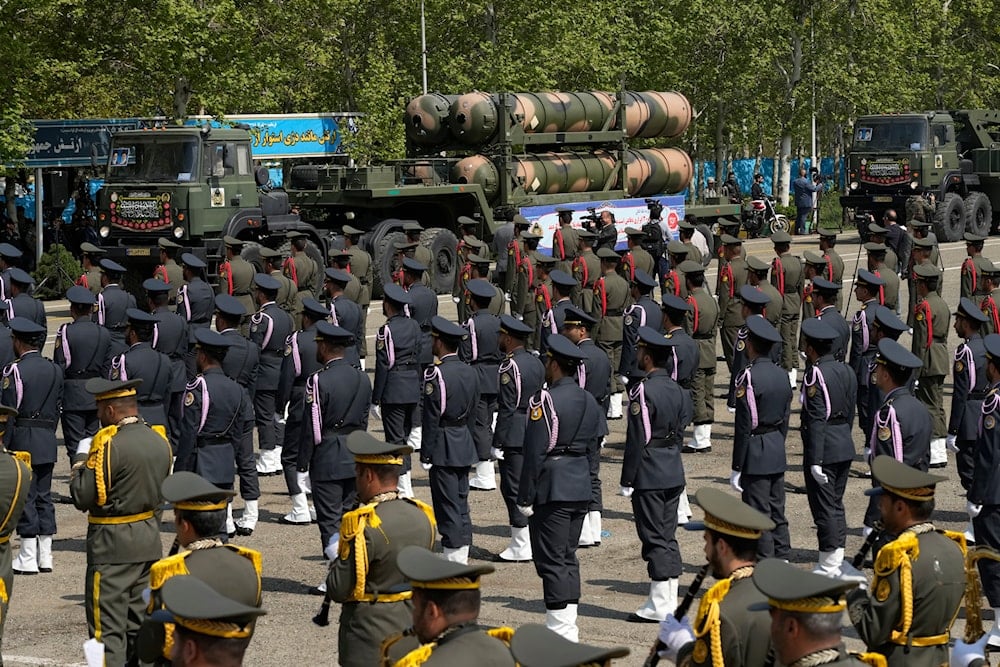US warns Iran of 'severe consequences' in case of retaliation: WSJ
The United States warned Iran against retaliating against the Israeli occupation's violation of its sovereignty.
-

A Russian-made S-300 air defense system is carried on a truck during Army Day parade at a military base in northern Tehran, Iran, Wednesday, April 17, 2024 (AP)
The United States has issued a stark warning to Iran, cautioning that any significant attack on the Israeli occupation could lead to "devastating consequences" for Iran's government and economy, The Wall Street Journal reported.
According to the WSJ, the US warned Iran directly and through intermediaries, who cited a senior US official speaking on condition of anonymity.
"The United States has sent clear messaging to Iran that the risk of a major escalation if they do a significant retaliatory attack against Israel is extremely high," the official said. The communication further emphasized that Tehran faces "serious risk of consequences for Iran's economy and the stability of its newly elected government if it goes down that path."
The Biden administration has been working to dissuade Iran and other members of the Axis of Resistance on the one hand and the Israeli occupation on the other from retaliating using military actions on the claim "that could further destabilize" the region as it seeks to reach a ceasefire deal in Gaza after it supported the genocidal Israeli campaign there for nearly a year.
It is noteworthy that the escalation taking place is due to the Israeli occupation assassinating Palestinian Resistance leader Ismail Haniyeh, head of the Hamas Resistance movement, in Iran, constituting not only a violation of international norms but also of Tehran's sovereignty.
US Secretary of State Antony Blinken confirmed on Tuesday that the message had been delivered directly to Iran, though he refrained from providing specifics on the content or the channels used to communicate it.
Not a US attack
Reportedly, the warning to Tehran was not meant to be interpreted as a threat of US military action against Iran but rather as a cautionary note about the likely response from the Israeli occupation.
However, the US has not ruled out the use of force to defend "Israel" if necessary. The US Central Command announced the deployment of F-22 stealth fighters to a base in the Middle East on Wednesday, in addition to sending more destroyers capable of intercepting ballistic missiles to the region amid escalating tensions.
An aircraft carrier, the USS Theodore Roosevelt, is also stationed in the Middle East, with an F/A-18 fighter squadron recently moved to a nearby base.
US officials have expressed uncertainty regarding the timing and scale of any potential Iranian response, contrasting the current situation with the events leading up to Iran's missile and drone attack on the Israeli occupation on April 13, which was in retaliation for the killing of a senior Iranian military commander in Damascus and the bombing of Tehran's consulate in Syria.
There is also concern about the possibility of Hezbollah coordinating an attack with Iran. Hezbollah's large arsenal of missiles poses a significant threat to the occupation, and a simultaneous attack could potentially overwhelm "Israel's" missile defense systems.
"Last time we got more of a heads up, and this time people are making their best guesses," another US official stated, underscoring the uncertainty and heightened tensions.
Israelis do not know what awaits them: IRGC
The spokesperson for the Iranian Islamic Revolution Guard Corps IRGC emphasized that there is "no doubt" that "Israel" will be the "loser from the cowardly" assassination of martyr Ismail Haniyeh, Hamas' former politburo chief.
"The Zionists do not know when, at what hour, on what day, or in what week, and how they will receive the response" for his assassination, said Brigadier General Ali Mohammad Naeini.
During a speech in the port city of Bandar Abbas, southern Iran, the general pointed out that "all the occupied territories have become inflamed," also referring to the Resistance in the West Bank, adding that "the Zionists do not know what awaits them," and that they are living in constant fear.
The commander of the IRGC, Major General Hossein Salami, affirmed on Monday that the Israeli regime "will receive a decisive response" and "will realize [then] it miscalculated".
"They will see when, where, and how they will receive the response," IRGC's top chief said

 4 Min Read
4 Min Read








